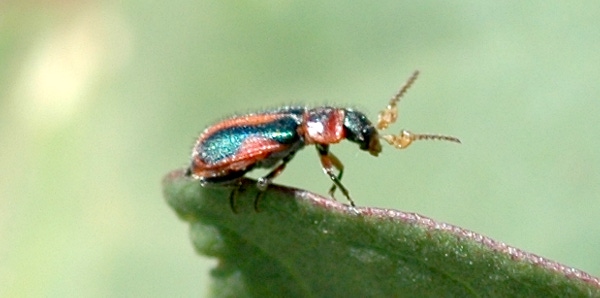
Collops beetles are natural predator insects in Arizona crop fields which differ since the bodies are not hard and shell-like;Collops consume whiteflies (eggs, nymphs, and adults), small lygus nymphs, aphids, mites, and lepidopteran eggs and caterpillars;Adults are about one-quarter-inch long with very dark, iridescent blue and red stripes on the back.
July 8, 2011

Collops, members of the soft-wing flower beetle family Melyridae, are natural predator insects in Arizona crop fields which differ from other beetles since the bodies are not hard and shell-like.
Collops are important predators that have a penchant for soft-bodied insects including whiteflies (eggs, nymphs, and adults), small lygus nymphs, aphids, mites, and lepidopteran (lep) eggs and caterpillars.
With so much Bt cotton around (94.5 percent in 2011 in Arizona in upland cotton), there are not many leps to eat. Collops concentrate on whiteflies, lygus, and a variety of immature insects. The natural predator also grazes on pollen and nectar resources.
Two Collops beetle species are found in Arizona cotton and other field crops during the summer season: Collops vittatus and Collops quadrimaculatus. C. vittatus is more abundant and some cotton fields are loaded with the insect right now. Extreme hot weather can reduce the numbers by limiting reproduction and immature development.
Larvae are predaceous in the soil litter but are rarely seen. Adults are about one-quarter- inch long with very dark, iridescent blue and red stripes on the back. The appearance is striking.
In other parts of the country, Collops are sometimes referred to as red-cross beetles. In Australia, there is a related predatory species that inhabits cotton called red and blue beetles.
Males and female Collops species can be distinguished by clearly visible structures present on the base of the male’s antennae.
Collops beetles can be important early to mid-season predators to help suppress the development of economic populations of a wide array of insects.
Arizona research suggests that Collops can be very important in the natural control of whiteflies in cotton; especially in conjunction with selective insecticides.
You May Also Like



